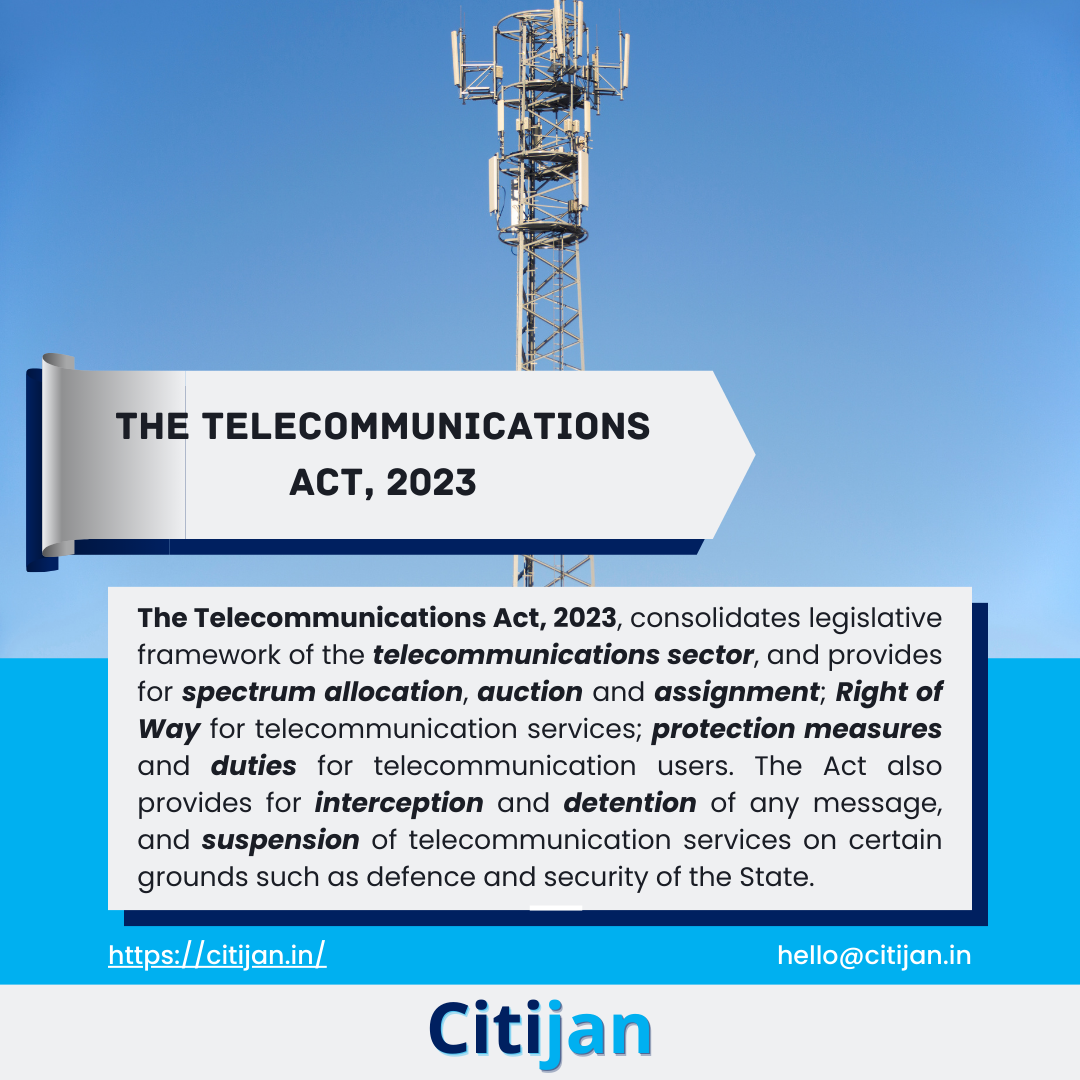The Telecommunications Act, 2023, published on 24th December, is a comprehensive legislation aimed at consolidating the legislative framework of the telecommunications sector in India.
The Act repeals Indian Telegraph Act, 1885, and Indian Wireless Telegraphy Act, 1933, but provides for the existing rules and regulations issued under these Acts to continue.
The Act encompasses various aspects related to the establishment, operation, and maintenance of telecommunication networks, including the assignment of spectrum. It introduces provisions for the protection of property rights, penalties for breaches of terms and conditions, and dispute resolution.
The Act provides revised comprehensive definitions for telecommunication, telecommunication network and telecommunication identifier, and provides that the implementation of the Act shall be digital by design.
The Act empowers Central Government to authorize entities to provide telecommunication services and operate telecommunication networks, and mandates the authorized entities to identify the consumers through use of any verifiable biometric based identification.
National Frequency Allocation Plan, as notified by Central Government, will govern the spectrum for telecommunications. The Act declares the spectrum to be utilized in a flexible, liberalized and technologically neutral manner.
For the services identified through The First Schedule, spectrum will be assigned through administrative process, and there will be no auction. Such services include national security and defence, law enforcement and crime prevention, meteorological department and weather forecasting, in-flight and maritime connectivity, space research, certain satellite-based services, BSNL and MTNL etc.
The Act empowers Central Government to assign spectrum through auction for services not listed in The First Schedule, and to grant exemptions, if it is necessary in the public interest.
The Act empowers Central Government to amend The First Schedule through notification, but mandates such notifications to be laid before each House of Parliament.
The Act also provides for re-assignment of the unutilized spectrum by a primary assignee, to a secondary assignee, for optimal use of the available spectrum.
The Act provides the legal framework for Right of Way for telecommunication networks, in the premises of both public and private property, and provides for non-discriminatory and non-exclusive grants of Right of Way. The Act also provides for dispute resolution mechanism concerning Right of Way.
The Act empowers Central Government to notify standards and conformity assessment measures for telecommunication equipment, networks, services, including for cyber security for telecommunication.
On the occurrence of any public emergency, or in the interest of public safety, the Act empowers both Central and State Governments to take temporary possession of any telecommunication service or network from its authorized entity.
The Act also empowers both Central and State Governments to intercept, detain or disclose any message, or to suspend transmission of any message, or to suspend any telecommunication service on certain grounds with reasons to be recorded in writing.
The Act provides for directions to be issued by the Central Government in the interest of national security, friendly relations with foreign States, or in the event of war. The Act also provides for declaration of Critical Telecommunication Infrastructure, through notification by the Central Government.
The Act reconstitutes Universal Service Obligation Fund, created under Indian Telegraph Act, 1885, as Digital Bharat Nidhi, under the control of the Central Government. Digital Bharat Nidhi shall be exclusively used for objectives such as promoting telecommunication services in underserved rural and remote areas, supporting research and development of telecommunication services etc.
The Act provides for creation of regulatory sandboxes by the Central Government to facilitate innovation and technological development in telecommunication.
The Act provides for measures for protection of users of telecommunication services, such as prior consent of users, 'Do Not Disturb' registers, and grievance redressal. The Act also provides for duties of users, such as not impersonating another person, not suppressing any material information, and not furnishing any false particulars for availing telecommunication services.
The Act declares offences and penalties concerning telecommunication services, and provides for detailed adjudication and appeal mechanism for disputes concerning the contraventions under the Act.
The Act prohibits use of any equipment that blocks telecommunication, unless permitted by the Central Government.
The Act amends Telecom Regulatory Authority of India (TRAI) Act, 1997, to reflect the changes brought in by the present Act, and also amends the provision for the qualification to be appointed as Chairperson and Member of TRAI. The amendment also provides that TRAI may direct authorized entities to abstain from predatory pricing that is harmful to competition, long term development and the overall health of the telecommunication sector.
You can download the Act text here.


